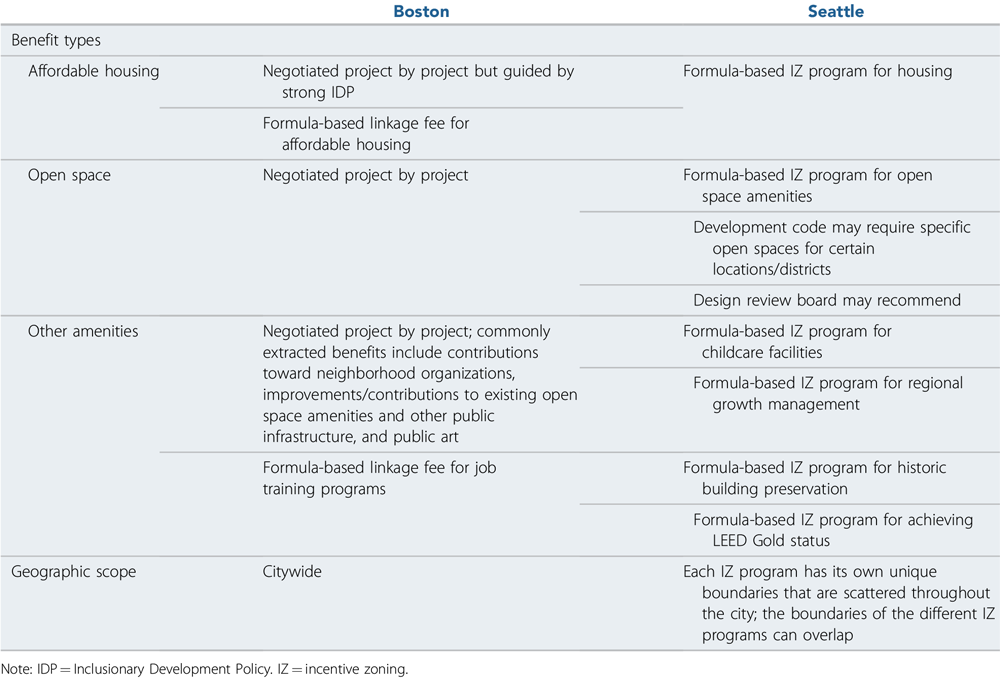You must be logged in to view this page. If you are making a purchase or registering for an event, please either log in or create a free account to complete your order.
Uncovering JAPA
Techniques for Securing Public Benefits from Development

For large-scale developments, local governments need to ensure that the benefits are greater than the socioeconomic costs. Exactions are one tool to mitigate the anticipated negative consequences and extract public benefits.
Exaction Strategies: Negotiation vs. Schedule-based
There are two main ways for localities to impose exactions — predetermined schedules or case-by-case negotiations. Which of these two strategies is more effective in safeguarding public benefits?
Author Minjee Kim explores the strengths and weaknesses of these two exaction approaches in "Negotiation or Schedule-Based?" in the Journal of the American Planning Association (Vol. 86, No. 2).
The article compares the exaction strategies from large-scale projects approved in 2016 in two major U.S. cities: Boston, with a long-standing negotiation process, and Seattle, with a preestablished Incentive Zoning (IZ) program that leaves little room for negotiation.

Side-by-side comparison of Boston's and Seattle's exaction approaches. From "Negotiation or Schedule-Based?" in the Journal of the American Planning Association (Vol. 86, No. 2).
Based on empirical data on zoning regimes and exaction strategies in both cities, the author evaluated four aspects: the efficacy of public benefit packages, transparency (number of public meetings held per project), procedural efficiency (median time to approval), as well as certainty and consistency in the decision-making process.
To compare the efficacy, Kim analyzed the exaction packages of affordable housing units, open spaces, and additional amenities that both cities have secured in a year.
The results show that Boston was able to extract significantly greater public benefits compared with Seattle in all criteria.
Seattle's IZ Program Streamlined But Limited
The outcome was shaped by various factors, including the limited scope of Seattle's IZ program (only projects of certain scale in certain locations are eligible for the available IZ programs), as well as the greater leverage that Boston's public officials and members of the community enjoy when negotiating development rights in exchange for public benefits.
In terms of transparency, Boston's negotiation-based strategy produced substantially more public hearings (30 out of 32 projects) than Seattle's (5 out of 52 projects). The scope of its public meetings was also wider — in Seattle, the design review meetings focused on design-related issues. This is due to legislative land use processes in Boston that need to be approved by formal public hearings, as well as additional public meetings that were added into the process by the city. Seattle's IZ program, which is administrative, requires approval only at the staff level.
Despite the commonly held belief that a project-based negotiation process will result in significant delays, the process of securing development rights in Boston was surprisingly faster, on average. The median review time was 226 days in Boston and 482 days in Seattle. This is because of Seattle's comprehensive design review process in which developers must secure approvals from the city board to move forward with the entitlement process.
Although the average entitlement process was faster in Boston, the huge variations in timeframes between projects demonstrate the uncertainties in the negotiation process.
In Boston, the entitlement process ranged from 57 days to five and a half years, whereas in Seattle, it varied from eight months to three years.
Boston: Negotiation, Benefits, Uncertainty, Inconsistency
Moreover, project-based negotiation can also cause inconsistent treatment in the process, which may lead to favoritism or corruption. The developers who are politically less connected are at a disadvantage in a negotiation-heavy administration in Boston, while developers in Seattle do not find the review process problematic due to its clarity and transparency.
While Boston's negotiation-based approach extracted greater public benefits and generated more public participation in the process, it produced uncertainties and inconsistencies that could negatively impact project financing and feasibility.
Seattle's schedule-based approach has been favored by developers due to its transparency, clarity, and certainty in its entitlement process, but it yielded more limited public benefit packages.
Local authorities must establish clear policies and guidelines to ensure procedural consistency. If this precondition can be achieved, negotiated exactions can be an extremely powerful tool to produce mutual benefits between developers and the community.
Top image: Photo from Pixabay.


